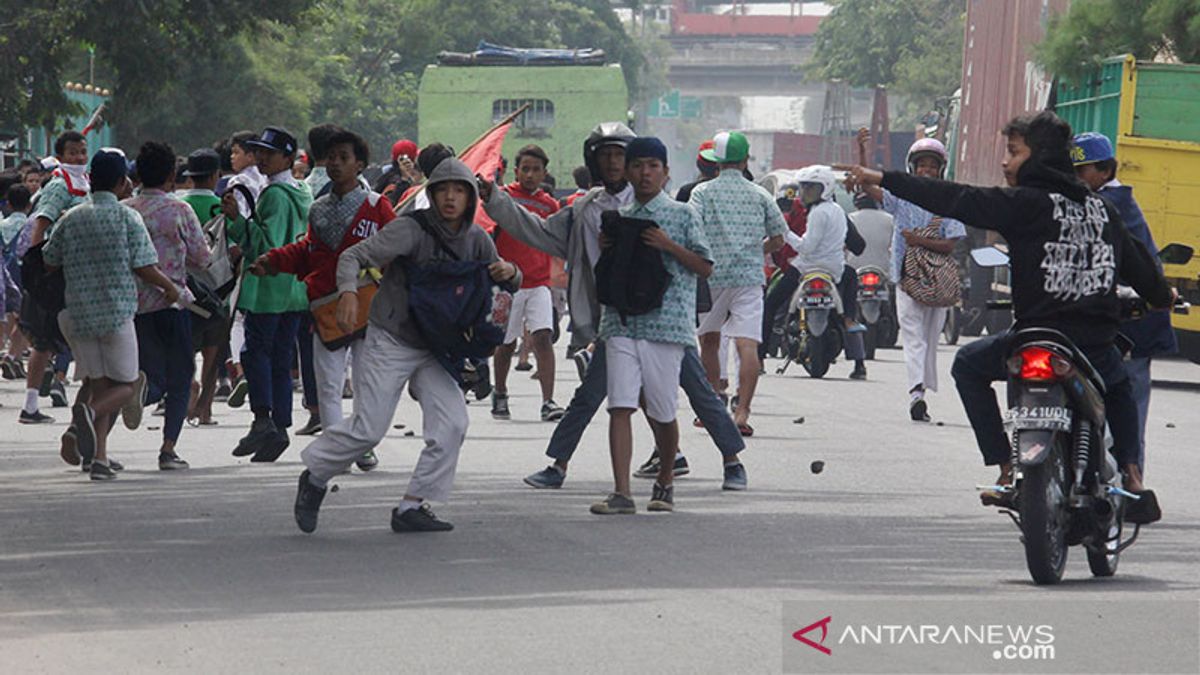JAKARTA – During Ramadan as it is now, news of brawls and youth violence often spreads before dawn. Therefore, the Indonesian National Police prohibits on-the-road suhoor activities, one of which is to prevent brawls.
Ramadan filtering held by Polda Metro Jaya, for example. During the first three days of Ramadan, dozens of motorbikes were confiscated, some of them with sharp weapons. The suspicion is clear, it will be used for brawls.
The conscience of the community is disturbed, with frequent criminal acts, especially in urban areas, which are carried out by young people or teenagers. Their delinquency has shifted to criminal acts that were originally just ordinary juvenile delinquency.
Brawls with various levels of violence, thugs, sexual violence, and even murder with victims of the same age.

The criminal acts of these youths are patterned, they can occur successively and then decline and then flare up again. Juvenile delinquency in English with the term juvenile delinquency, is a social pathological symptom in adolescents caused by a form of social neglect.
As a result, they develop deviant forms of behavior. The highest number of crime acts is at the age of 15-19 years, and after the age of 22, the number of crimes committed by teenagers will decrease.
It is undeniable that the crimes committed by these teenagers cause fear and anger because they are helpless.
200 Thousand Murder CasesAccording to data from the World Health Organization (WHO) in 2020, every year there are 200 thousand murders among young people aged 12-29 years. As many as 84 percent of cases involve young men. WHO states that violence among young people has become a global public health issue. Such as physical violence, bullying, sexual violence to murder. Global youth crime is more common in urban areas.
Quoted from Sciencedirect.com, Journal of a Theory of General Causes of Violent Crime, Mario Coccia a researcher from Arizona State University, Center for Social Dynamics and Complexity examines crime rates in developed and developing countries between 1990-2000. The research focused on homicides in 40 countries and robberies in 33 countries.
He found that the higher a person's education level, it was linked to a better job and income. It prevents them from engaging in criminal acts, especially those related to possession, theft, robbery, and murder. Young men are more vulnerable to violence than the rest of the population.
This study also shows that adolescents from single and poor parents have the potential to be involved in criminal acts. Single parents can be translated parents who are divorced or parents are still together, but the function of the family is not well established.

Children who are in an environment of chaotic household conditions will have an impact on children in the form of feelings of insecurity, unprotectedness, and lack of attention and affection. All of these components will trigger the vulnerability of the child's soul into unhealthy relationships in their environment.
Quoted from Secureteen.com, Why Teens Turn into Criminals, Finding the Root Causes, the cause of juvenile delinquency becoming criminal can be caused by internal factors, namely an identity crisis. Adolescents who cannot learn and distinguish between acceptable and unacceptable behavior will be dragged into naughty behavior, bad peers.
Juvenile delinquency in the form of criminal acts can have a great influence in society, even though their influence is not desired. Because with the rise of news of crime among teenagers, it encourages us to ask the cause of the action.
To tackle youth and child protection, various interrelated components are needed. It includes a social welfare system for children and adolescents and their families, a justice system that conforms to international standards, and mechanisms to encourage appropriate juvenile behavior in society and its environment.
How to Deal with Juvenile Delinquency?Quoted from the UGM website, developmental psychology expert, Dr. Arum Febrianti, MA, agrees that the best prevention effort is to start from the family institution. Arum said those klitih perpetrators did not suddenly become criminals. There is a track record behind all of that which came to be known as a person's developmental path.
"Parental control, emotional closeness, and building communication with them are very important," said Arum, during a discussion about the klithih gang in Yogyakarta, January 13, 2022, as quoted from the UGM YouTube channel.
This means that a child has experienced many things. Then if the family cannot function to set a good example, protect their family, and so on, then the child has the opportunity to fall into acts of klitih behavior.
As reported by Helpguide.org, family plays an important role, and this is recognized by many. The family is an important element in socializing the values, norms, and goals agreed upon in society. The high rate of juvenile crime as a consequence of the non-compliance of the rules and norms that apply in society is considered a family fault.

From a theoretical point of view, of course, it's not only the family that is to blame. The public can also be blamed for not strictly enforcing the rules, or for helping to socialize norms and goals in society.
Parents tend to judge teenagers for what they do without knowing what the problem is behind it. Behaving like that is not fair to children. So, before judging a naughty child, ask carefully what really happened.
Find ways to reduce anger, because the changing hormones of teenagers will tend to get angry quickly. Therefore, one of the duties of parents is to know how to relieve anger at the child. Many things can be done, for example, familiarize them with listening to music, writing, or playing games.
There are with children, sometimes parents are busy alone. They only give money to their children but do not give them affection. This is very trigger youth violence. Therefore, take your time for your child, whether listening to his story or providing solutions to problems he is experiencing. This habit must be built from an early age.
The English, Chinese, Japanese, Arabic, and French versions are automatically generated by the AI. So there may still be inaccuracies in translating, please always see Indonesian as our main language. (system supported by DigitalSiber.id)









